You might be wondering which vacuum cleaner reigns supreme in the showdown between the Roomba i3 vs i7. I’m here to lend a hand. To put it simply, making a decision is a no-brainer for me: the clear winner is the Roomba i7.
The Roomba i7 edges ahead with its superior performance in cleaning edges. Furthermore, it earns my vote thanks to its comprehensive mapping capabilities. While it does come with a higher price tag, the added cost is well worth it when you consider the advanced features it brings to the table.
If you’re on a budget and do not care about features like “keep out zones” and “clean zones,” I’d suggest going with the Roomba i3. In terms of performance on both carpets and hard surfaces, the Roomba i3 holds its own just as effectively as the Roomba i7. By choosing the i3, you’ll save a few hundred dollars while still enjoying the same level of cleaning performance. It’s a smart budget-friendly choice!
Roomba i3 vs i7: Comparison Chart

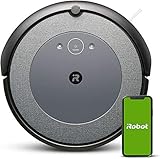


Roomba i3 vs i7: Differences
The Roomba i7 comes out on top in the battle against the Roomba i3 with a final score of 3-1 in wins and 1 ties. Keep reading to discover more about their differences.
Cleaning Performance
The Winner: Roomba i7
Roomba i3 vs i7 both have dual rubber brushes and the same suction power, which is probably why I think they’re pretty much on par when it comes to cleaning. I’ve noticed that whether it’s my hard floors or carpets, both the Roomba i3 and i7 are champs at snatching up all sorts of debris – big or small. However, the Roomba i7 has a slightly better performance on cleaning edges.
Brush Roll System
First, let’s dive into their brushes. Both of these vacuums sport iRobot’s patented dual brush design. One brush is all about stirring up the dirt, while the other lifts it away. Thanks to this setup, these robots aren’t just good on hard floors; they handle carpets like a breeze too.
Plus, these dual brushes aren’t the typical bristle ones – they’re made of rubber. That’s a game-changer when it comes to keeping hair from getting all tangled up in the roller. I have a furry friend at home and noticed that their fur hardly ever causes a fuss. But fair warning, if you’ve got long hair that likes to shed, it might still wrap itself around the roller.
At least, since the roller is rubber, it’s a breeze to snip away any hair wraps. Just keep an eye out for those little tangles and give them a cut when needed. It’s a small task that can prevent any nasty clogs that might stop your vacuum in its tracks.
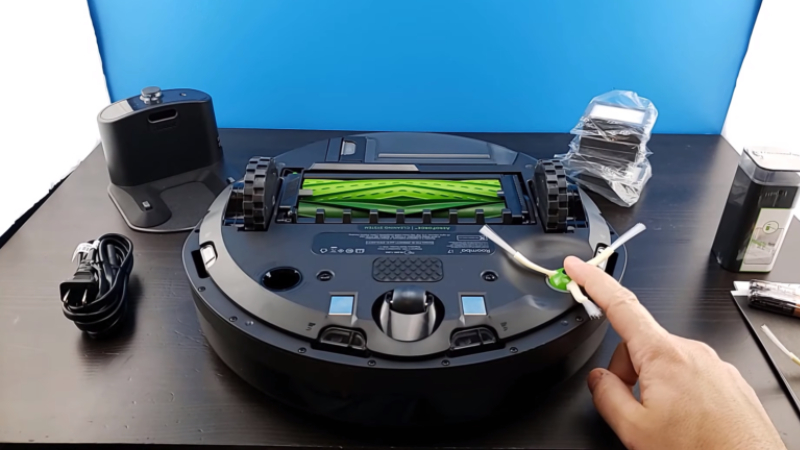
Plus, they’ve got a handy sidekick – a side brush that goes the extra mile to sweep the tricky nooks, crannies, and walls. Personally, I’ve noticed the i7 has a knack for cleaning edges a tad better than the i3. It gets just a smidge closer to those edges as it glides parallel to them, resulting in better pickup in those hard-to-reach spots.
Suction
The Roomba i3 and i7 both boast impressive power levels, with the company claiming their suction is 10 times stronger than the 600 series Roombas. However, it can be a bit challenging to grasp what that actually means. If you’ve never used a vacuum from the 600 series Roombas, it’s hard to visualize just how powerful the Roomba i3 and i7 are, isn’t it? I just say “Roomba i3 and i7 have Amazing suction!“
I put these Roombas to the test on a carpet that had just been freshly vacuumed by my central vac and even professionally cleaned a few hours earlier. To my surprise, after just 5 or 6 passes, they still managed to scoop up a ton of pet hair and dust that had somehow been left behind. Impressive, right?
Design & Usability
The Winner: Roomba i7
Dimensions, Weight & Aesthetics
| Roomba i3 | Roomba i7 | |
|---|---|---|
| Dimensions (WxH) | 13.26 x 3.63 inches | 13.26 x 3.63 inches |
| Weight | 7.44 lbs. | 7.44 lbs. |
These robots are quite similar in size, weight, and shape. They both measure 13.26 x 3.63 inches (width x height), which is compact enough for them to easily slip under most beds and sofas. Plus, they’re so lightweight that I can effortlessly carry them from one floor to another.
Their appearance does have a slight difference, particularly in the design of their tops. While this distinction might not be a big deal, it’s still worth noting for those who are keen on the details.
Initially, I mistook the top of the Roomba i3 for cloth material, but it surprised me to discover that it’s actually made of textured plastic designed to mimic the appearance of cloth. In my opinion, this gives it a sleeker look compared to the i7. Rest assured, if dirt happens to cling to it, you can easily give it a wipe-down without any fuss. The Roomba i7’s top does have a few more nooks and crannies, mainly due to the presence of a camera, but it’s still a breeze to keep clean.
Battery Life
| Roomba i3 | Roomba i7 | |
|---|---|---|
| Run Time | 70-75 minutes | 70-75 minutes |
| Charging Time | 3 hours | 2 hours |
The i3 and i7 share the same battery life, clocking in at around 70-75 minutes, which is a bit below average. But both of these bots come with a nifty recharge and resume feature. So, in my book, fretting over battery life isn’t really a big deal anymore. They’ll take a pit stop to recharge when their battery is low and then get right back to cleaning right where they left off.
The i3 takes a bit longer to charge, requiring a three-hour compared to the i7’s quick two-hour turnaround for a full charge.
Navigation & Obstacle Avoidance
The most significant difference between the Roomba i3 and i7 lies in their navigation technology.
The Roomba i3 relies on a gyroscope and an optical sensor located on the bottom of the robot to navigate. The sensor helps the Roomba keep track of where it’s already cleaned in your home. While I can’t say for sure how it works down to the nitty-gritty details, my best guess is that it scans the floor continually, piecing together a map of your home as it goes. Or maybe it’s just a touch of magic in there – who knows?
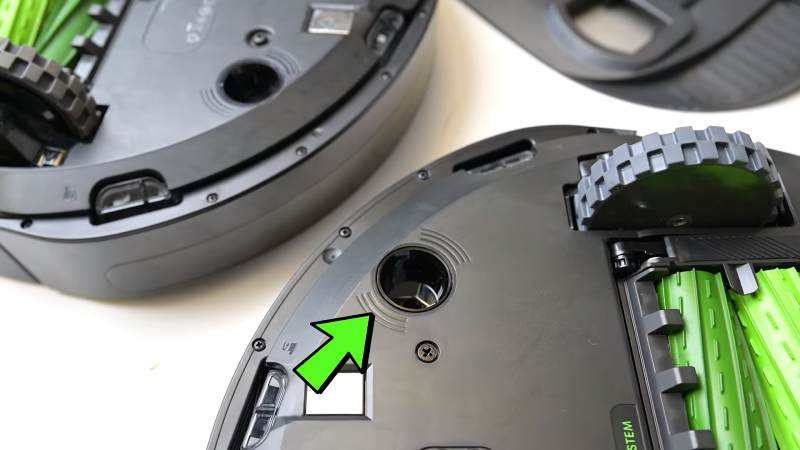
Now, the Roomba i7 takes a slightly different route. It’s got a camera perched on top of the robot, and this setup allows it to navigate with a tad more efficiency, wrapping up its cleaning cycles a bit faster than the i3.
The camera gives the i7 a precise map of your home by pinpointing its location in relation to the furniture pieces. This fancy mapping ability opens the door to some nifty features like the handy “keep out zones” I will talk about shortly.
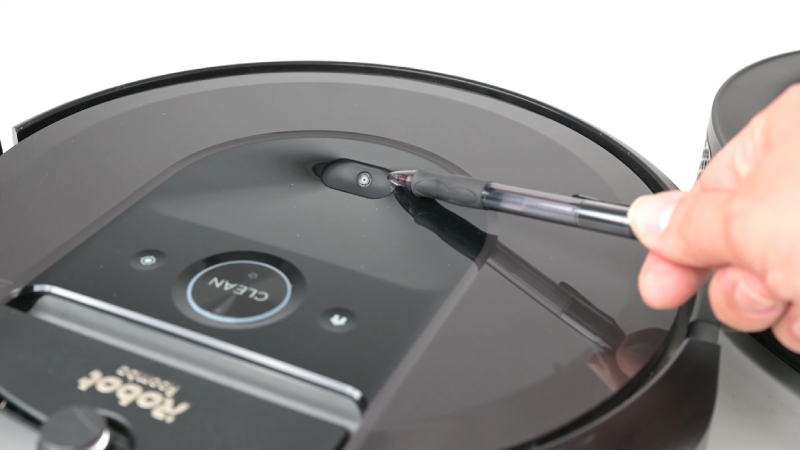
While the i3’s floor tracking system might be considered less precise than the i7’s camera, in practice, I haven’t really noticed a significant difference between the two.
Control
The Winner: Roomba i7
Manual Control
No matter how high-tech vacuum cleaners get with all their app compatibility and voice control tricks, there’s one thing you can’t do without: manual control. Surprisingly, even though the tops of these two machines look a bit different, their manual control systems are actually identical.
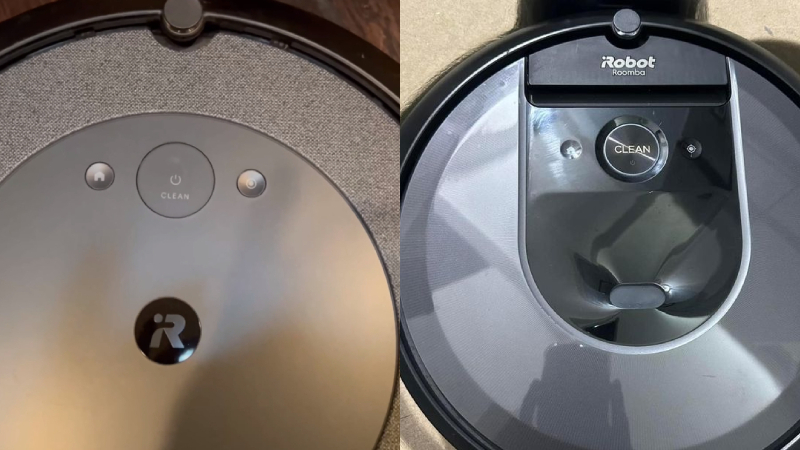
Their user interface both included:
- Home Button
- Light Ring Indicator
- CLEAN/Power Button
- Spot Clean Button.
If your cleaning needs are pretty straightforward, using these buttons for control is a breeze. It’s quick and easy, making it a simple solution for basic cleaning tasks.
App Compatible & Mapping
The difference in navigation technology also translates into differences in mapping capabilities. As I mentioned earlier, the Roomba i7 boasts more advanced navigation tech, making it a full-fledged mapping robot, whereas the i3 falls a bit short in this department.
With the i7, it generates a map of the cleaned area and then allows you to label rooms, request the robot to vacuum specific rooms, and even set up “keep out zones” and “clean zones” using the iRobot app.
On the other hand, the i3 does generate a cleaning map, but its mapping functionality is far more limited. You can label rooms and request it to clean particular rooms, but it doesn’t offer the bells and whistles of “keep out zones” or “clean zones” as the i7 does.
With the Keep Out Zone feature, you can draw boxes in the iRobot app to mark areas in your home where you don’t want the robot to clean. I find this feature handy for pet owners like me. I want to keep the robot away from my pets’ water bowls. The i3, unfortunately, doesn’t offer this capability. So, if you’re a pet owner or have delicate items in your home that could be pushed around by the Roomba, the i7 might be the better choice for you.
Furthermore, the Roomba i7 offers the impressive capability to store up to 10 different floor plans. In contrast, the Roomba i3 can only remember a single map. So, if you have a multi-floor home, the Roomba i7 becomes a much more appealing choice.
Voice Control
Good news for the voice-command enthusiasts out there: both of these robot vacuums play nicely with voice assistants like Alexa, Google Assistant, and even Siri. So, whether you prefer to boss your Roomba around with a voice command or go the traditional app or button route, you’re covered with either of these smart machines.
Cleaning & Maintenance
The Winner: Tie
When it comes to dirt bins and filters, both the Roomba i3 and i7 are equipped with a 0.4-liter onboard dustbin and a HEPA filter, which is great for trapping allergens and particles.
However, it’s important to note that neither of these robots comes with self-cleaning bases or automatic disposal systems. What you get is just a standard dock for recharging – no fancy auto dust disposal included. So, you’ll need to roll up your sleeves and manually empty their dustbin when they fill up.
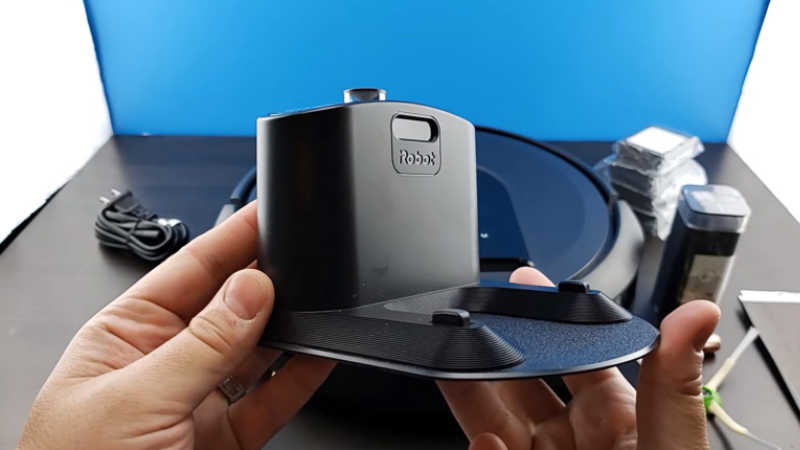
If your home is relatively free from pet fur or constant dirt tracking, then emptying the dustbin won’t be much of a hassle after a thorough cleaning session. But, if your pet is on a shedding spree, that bin can fill up at lightning speed. And you might find yourself doing more frequent emptying sessions. It all depends on the level of fur and dirt traffic in your home!
iRobot also offers upgraded versions with the self-cleaning base, namely the Roomba i3+ and Roomba i7+. This nifty gadget not only saves you the hassle of daily manual bin-emptying but also comes as a huge relief for folks dealing with severe allergies. On the flip side, if you already own a Roomba i3 or i7 and want to level up your vacuum game, you can separately purchase the Clean Base to enjoy the same convenience.
Price
The Winner: Roomba i3
In terms of price, the Roomba i3 is generally the more budget-friendly option compared to the Roomba i7. The i7 comes with advanced mapping and navigation features, which justify its higher price point.
However, if you’re looking for a more cost-effective option and don’t need the advanced mapping capabilities, the Roomba i3 can be a great choice for its cleaning performance and basic mapping capabilities. It ultimately depends on your specific needs and budget.
Quick Rundown Of Roomba i7
- POWERFUL PERFORMANCE AND POWERFUL PICK-UP - Pulls in stubborn dirt and messes with a Premium 3-Stage Cleaning System and 10X the Power-Lifting Suction. (Compared to the Roomba 600 series cleaning system)
- GUIDED BY SERIOUS SMARTS - With vSLAM navigation, the i7 learns the layout of your home and builds personal Smart Maps, enabling it to expertly clean and navigate in neat, efficient rows.
- VACUUMS MESSES IN THE MOMENT - Cleaning crumbs is now as easy as “Roomba, clean under the kitchen table.” A simple request to your voice assistant or via the iRobot Home app enables the i7 to clean messes for you, right when they happen.
- COMPLETE CONTROL OF YOUR CLEAN - With Smart Mapping, your robot knows your kitchen from your living room, so you can decide where it cleans and when. With Keep Out Zones, your robot knows to avoid sensitive areas like pet bowls or play areas.
- A CLEAN UNIQUE TO YOU - The Roomba i7 robot vacuum is smarter than ever, learning where and when you normally clean and suggesting personalized schedules so you can focus on everything else.
Quick Rundown Of Roomba i3
- POWERFUL CLEANING—SCHEDULED AROUND YOUR LIFE - Whether you’re relaxing at home or out enjoying life, Roomba i3 EVO takes care of dirt and messes with a Premium 3-Stage Cleaning System and 10x the Power-Lifting Suction*. *Compared to Roomba 600 series.Runtime : 75 minutes
- CLEAN BY ROOM, YOU’RE IN CONTROL - Roomba i3 EVO learns your home and creates an Imprint Smart Map so you can direct it to clean any room you want, any time you want—either on a set schedule or in the moment.
- CLEANING IN TIDY ROWS - Cleans intelligently in straight lines back and forth, to thoroughly clean your floors while navigating around furniture. When the i3 EVO needs to recharge, it will resume right where it left off ensuring a complete clean. Charger : 120V and 60 Hz
- FOCUSED CLEANING - Patented Dirt Detect Technology allows the Roomba i3 EVO to detect dirtier areas of your home and clean them more thoroughly. Integrated sensors tell the robot where it can and can’t fit, so it doesn’t get stuck under furniture.
- PERFECT FOR HOMES WITH PETS - Instead of using a single bristle brush, Roomba i3 EVO uses Dual Multi-Surface Rubber Brushes that flex to adjust to different floor types and avoid getting tangled with pet hair.
Product Videos
Related Articles to Roomba I7
- Roomba i4 vs i7: Choosing The Ideal Robot Vacuum For Your Home
- Roborock S7 Vs Roomba I7: Which Will Win The Battle Of Performance?
- iRobot I7 Vs S9: Which High-End iRobot Roomba is Better?
Related Articles to Roomba I3
- iRobot Roomba I3 Vs S9+: A Detailed iRobot Vacuum Comparison
- Roomba 692 vs i3: A Head-To-Head Comparison
- Roomba 671 Vs I3: Pros, Cons, and Performance
- Roborock Q5 vs Roomba I3: Clean Homes Powerhouse Face-Off!
- Roomba 981 Vs I3: How Do You Choose The Best Option For Your Home?
- Roomba 698 vs i3: Best Picks for Your Home!
- Roomba i3 vs j7: A Clash of Premium vs. Entry-Level Models
- Roomba i3 vs i4: Which Affordable Entry-Level Roomba Is the Better Choice?
- Neato D8 vs Roomba i3: Which Robot Vacuum Is Right For You?
- Roomba i3 vs 960: Which iRobot Roomba Is The Most Affordable Option?
- Eufy G30 vs Roomba i3: Which Is The Better Option For Your Home?
References:

Richard B. Schmidt is a prominent figure in the vacuum cleaner industry, boasting over 15 years of expertise. Armed with a Robotics Engineering degree from Northeastern University and a Master’s in Consumer Science from Harvard, his unique blend of technical knowledge and consumer insights positions him as a sought-after authority in vacuum cleaner evaluation. Richard’s career began at Dyson, where he contributed to the development of innovative vacuum models. Transitioning to advocacy and reviews, he co-founded the first Vacuum-focused blog in 2008, offering comprehensive analysis and user guides for various vacuum cleaners. In 2020, he founded RoboMop.net, providing ongoing insights through columns and buyer’s guides.
